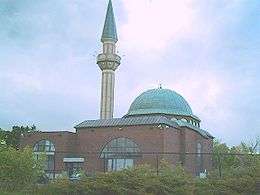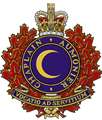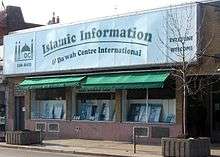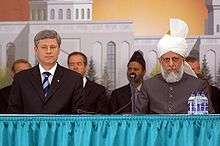Islam in Canada

According to Canada's 2011 National Household Survey, there were 1,053,945 Muslims in Canada, or about 3.2%[1] of the population, making Islam the second largest religion in the country after Christianity. In the Greater Toronto Area (GTA), 7.7% of the population is Muslim, and in Greater Montreal, 6% of the population is Muslim.[2] A majority of Canada's Muslim population follows Sunni Islam, while a significant minority adhere to the Shia and Ahmadiyya branches.[3]
Demographics, concentration, and life
| Historical population | ||
|---|---|---|
| Year | Pop. | ±% |
| 1854 | 3 | — |
| 1871 | 13 | +333.3% |
| 1901 | 47 | +261.5% |
| 1921 | 478 | +917.0% |
| 1931 | 645 | +34.9% |
| 1971 | 33,430 | +5082.9% |
| 1981 | 98,165 | +193.6% |
| 1991 | 253,265 | +158.0% |
| 2001 | 579,640 | +128.9% |
| 2011 | 1,053,945 | +81.8% |
| 2013 | 1,153,677 | +9.5% |
| Note:[4] | ||
The majority of Canadian Muslims live in the provinces of Ontario and Quebec. According to the 2011 National Household Survey, there were 424,925 Muslims living in the Greater Toronto Area equalling 7.7% of the total metropolitan population.[5] It consists of people especially a large number of Muslims of Pakistani, Bangladeshi, Indian, Iranian and Egyptian/Arab descent. Greater Montreal's Muslim community was 221,040[6] in 2011 or nearly 6% of the total metropolitan population which includes a highly diverse Muslim population from Western/Southern Europe, Caribbean, North Africa, the Middle East, and the Indian subcontinent. Canada's national capital Ottawa hosts many Lebanese, South Asian and Somali Muslims, where the Muslim community numbered approximately 65,880 or 5.5% in 2011.[7] In addition to Toronto, Ottawa and Montreal, nearly every major Canadian metropolitan area has a Muslim community, including Vancouver (73,215), where more than a third are of Iranian descent, Calgary (58,310), Edmonton (46,125), Windsor (15,575), Winnipeg (11,265), and Halifax (7,540). In recent years, there has been rapid population growth in Calgary and Edmonton because of the booming economy.
Most Canadian Muslims are people who were raised Muslim. As with immigrants in general, Muslim immigrants have come to Canada for a variety of reasons. These include higher education, security, employment, and family reunification. Others have come for religious and political freedom, and safety and security, leaving behind civil wars, persecution, and other forms of civil and ethnic strife. In the 1980s, Canada became an important place of refuge for those fleeing the Lebanese Civil War. The 1990s saw Somali Muslims arrive in the wake of the Somali Civil War as well as Bosniaks fleeing the breakup of the former Yugoslavia. However Canada has yet to receive any significant numbers of Iraqis fleeing the Iraqi War. But in general almost every Muslim country in the world has sent immigrants to Canada – from Pakistan, Bosnia and Herzegovina and Albania to Yemen and Bangladesh.[8]
The fertility rate for Muslims in Canada is higher than the rate for other Canadians (an average of 2.4 children per woman for Muslims, compared with 1.6 children per woman for other populations in Canada).[9]
There are a plethora of Halal/Zabihah restaurants across Canada, and many are located in the Greater Toronto Area. In Toronto alone, there are more than 400 Halal/Zabihah restaurants [10]
Table 1: Muslim Population of Canada in 1991,[4] 2001, and 2011[11]
| Province | Muslim 1991 | % 1991 | Muslim 2001 | % 2001 | Muslims 2011 | % 2011 |
|---|---|---|---|---|---|---|
| 145,560 | 1.4% | 352,530 | 3.1% | 581,950 | 4.6% | |
| 44,930 | 0.6% | 108,620 | 1.5% | 243,430 | 3.1% | |
| 31,000 | 1.2% | 49,045 | 1.7% | 113,445 | 3.2% | |
| 24,925 | 0.7% | 56,220 | 1.4% | 79,310 | 1.8% | |
| 3,525 | 0.3% | 5,095 | 0.5% | 12,405 | 1.0% | |
| 1,185 | 0.1% | 2,230 | 0.2% | 10,040 | 1.0% | |
| 1,435 | 0.1% | 3,550 | 0.4% | 8,505 | 0.9% | |
| 250 | 0.0% | 1,275 | 0.2% | 2,640 | 0.3% | |
| 305 | 0.0% | 630 | 0.1% | 1,200 | 0.2% | |
| 60 | 0.0% | 195 | 0.1% | 660 | 0.5% | |
| 55 | 0.1% | 180 | 0.5% | 275 | 0.7% | |
| – | – | 25 | 0.1% | 50 | 0.2% | |
| 35 | 0.1% | 60 | 0.1% | 40 | 0.1% | |
| 253,265 | 0.9% | 579,640 | 2.0% | 1,053,945 | 3.2% |
As the Canadian Charter of Rights and Freedoms guarantees freedom of religious expression, Canadian Muslims face no official religious discrimination. Under Section 2(a) of the Charter, the wearing of a hijab is permitted in schools and places of work, although Quebec has ruled that medical faculties are not required to accommodate Muslim women who wish to be served by female employees.[12] Religious holidays and dietary restrictions are also respected, but outside major urban areas it may be difficult to find halal food. It is also often difficult to observe Islamic rules against usury. Some Muslims in some parts of Canada have asked to have family dispute courts to oversee small family cases but were faced with rigorous opposition from both within the Muslim community (both conservative and liberal), and by non-Muslim groups.[13][14]
In 2011, the Harper government attempted to ban the niqab during citizenship ceremonies.[15] In 2015, the Federal Court of Appeal ruled against the ban,[16] and the Supreme Court turned down the government's appeal.
History

Four years after Canada's founding in 1867, the 1871 Canadian Census found 13 European Muslims among the population.[17][18] A great number of Bosniaks (from Bosnia) came to American soil much like Christians from Europe; some came before the First World War. The first Muslim organization in Canada was registered in 1934 in Regina, Saskatchewan, consisting of immigrants from Lebanon. The first Canadian mosque was constructed in Edmonton in 1938, when there were approximately 700 European Muslims in the country.[19] This building is now part of the museum at Fort Edmonton Park. The years after World War II saw a small increase in the Muslim population. However Muslims were still a distinct minority. It was only after the removal of European immigration preferences in the late 1960s and early 1970s that Muslims began to arrive in significant numbers.
Bosniaks were the initiators and one of the main participants in founding of all first mosques in Toronto. First masjid, out of which the three oldest mosques in Toronto came were founded by Bosniaks and Albanians in 1968. The first masjid in Toronto was named Jami Mosque (56 Boustead Ave. Toronto). Later, with the action of University of Toronto professor Qadeer Baig, it was purchased by Asian Muslims, while Albanians and Bosniaks later founded their own mosques: Albanian Muslim Society of Toronto on 564 Annette St. and Bosanska džamija (Bosnian Mosque) at Bosnian Islamic Centre.
The first Madressa (Islamic seminary) in North America; Al-Rashid Islamic Institute (http://alrashid.ca) was established in Cornwall, Ontario in 1983 and has graduates that are Hafiz (Quran) and Ulama. The Seminary was established by Maulana Mazhar Alam, originally from Bihar, India, under the direction of his teacher the leading Indian Tablighi scholar Muhammad Zakariya Kandhlawi and focuses on the traditional Hanafi school of thought. Due to its proximity to the US border city of Massena the school has historically had a high ratio of US students. Their most prominent graduate Shaykh Muhammad Alshareef completed his Hifz in the early 1990s then went on to form the AlMaghrib Institute.

According to the Canadian Census of 1971 there were 33,000 Muslims in Canada.[20] The oldest mosque in Toronto, with the oldest minaret in Ontario, built in Osmanic style is the one in Etobicoke, that is part of the Bosnian Islamic Centre,[21] whose readjustment into masjid (originally an old Catholic school building) was over on June 23, 1973. Mosque (an old Catholic school, bought for 75 000 CAD) was readjusted for the Bosniaks, with the support of the local Christians. In the 1970s large-scale non-European immigration to Canada began. This was reflected in the growth of the Muslim community in Canada. In 1981, the Census listed 98,000 Muslims.[22] The 1991 Census indicated 253,265 Muslims.[23] By 2001, the Islamic community in Canada had grown to more than 579,000.[24] Estimates for the Census 2006 pointed to a figure of 800,000.[3] As of May 2013, Muslims account for 3.2% of the total population, with a total of over a million, and Islam has become the fastest growing religion in Canada.[25][26] In 2017 the organisations ISNA Islamic Services of Canada and Canadian Islamic Trust Foundation were stripped of their status as charities by the government of Canada after an investigation revealed links to a foreign militant group. Both the stripped associations shared their postal address in Mississauga with ISNA-Canada.[27]
In 2018 Ottawa Islamic Centre and Assalam Mosque was stripped of its charity status by the Canadian government because many of its guest speakers were misogynistic, homophobic, racist and promoted violence.[28] The Canadian Revenue Agency also raised concerns that radicalized individuals had attended the mosque, one of whom was imprisoned for having attempted to join the Islamic State of Iraq and the Levant.[28]
Groups
Major Canadian cities have local Muslim organizations that deal mainly with issues pertaining to their home city, but that support national associations.. Most Muslim organizations on the national level are umbrella groups and coordination bodies. Student-led initiatives are generally well supported and successful, including annual events such as MuslimFest and the Reviving the Islamic Spirit conference, the largest Islamic event in Canada.

Shia Muslims
Ahmadiyya Muslims

The Ahmadiyya Muslim Community Canada acts as an Ahmadi Muslim representative. It has about 50 Local Chapters scattered across Canada, concentrating mainly in southern Ontario. The community has good relations with the government and helps in humanitarian causes. Baitun Nur is the largest mosque in Canada.[29][30]
Identity and beliefs
In a 2016 Environics poll, 83% of Muslims were "very proud" to be Canadian, compared with 73% of non-Muslim Canadians who said the same thing. Canadian Muslims reported "Canada's freedom and democracy" as the greatest source of pride, and "multiculturalism and diversity" as the second greatest. 94% of Canadian Muslims reported a "strong" or "very strong" sense of belonging to Canada. 48% of Canadian Muslims attend mosque at least once a week. 53% of women wear some sort of head-covering in public (48% wear the hijab, 3% wear the chador and 2% wear the niqab). Both pride in being Canadian and having a strong sense of belonging had increased in Canadian Muslims as compared to a 2006 survey. Mosque attendance and wearing a head covering in public had also increased since the 2006 survey.[32]
Prominent Canadian Muslims
Media
- Little Mosque on the Prairie was a Canadian sitcom on CBC Television created by Zarqa Nawaz.
Burka Ban
On 12 December 2011, the Canadian Minister of Citizenship and Immigration issued a decree banning the niqab or any other face-covering garments for women swearing their oath of citizenship; the hijab was not affected.[33] This edict was later overturned by a Court of Appeal on the grounds of being unlawful.
People such as Tarek Fatah[34][35][36] and Ensaf Haidar[37][38] have called on the burka to be banned.
See also
- Religion in Canada
- Islamophobia in Canada
- Category containing Canadian Muslims
- List of mosques in Canada
- List of Canadian Muslims
- List of Canadian Shia Muslims
- Bosniaks
Groups and councils
References
- ↑ Muslims in Canada, Canada 2011 National Household Survey
- ↑ The Profile of Muslims In Canada Archived 2012-02-03 at the Wayback Machine., Abdul Malik Mujahid.
- 1 2 Muslims and Multiculturalism in Canada Archived 2012-01-27 at the Wayback Machine.. March 2007. Retrieved 26 March 2011.
- 1 2 Muslim Demographics and History in Canada
- ↑ Toronto Muslim Population
- ↑ Montreal Muslim Population
- ↑ Ottawa Muslim Population
- ↑ 2001 Census of Canada: http://www12.statcan.ca/english/census01/home/index.cfm
- ↑ Region: Americas
- ↑ Zabihah.com
- ↑ http://www12.statcan.gc.ca/nhs-enm/2011/dp-pd/prof/index.cfm?Lang=E
- ↑ "Quebec health board not obliged to accommodate minorities". CBC News. 16 March 2010.
- ↑ Boase, Sharon, "Women's groups fight sharia in Ontario; Two reports submitted by a Muslim women's organization say introducing Islamic law into the province will harm the rights of vulnerable women", Hamilton Spectator, September 16, 2004
- ↑ Ogilvie, Megan, "Canadian Muslims give mixed reviews on moratorium; Debate urged on Islamic penal code Proposal would halt death penalty Proposal would halt stoning, death penalty Debate urged on Islamic penal code", Toronto Star, April 1, 2005.
- ↑ Smith, Teresa (16 December 2011). "Veiled threat: Niqab ban has some fearing a less tolerant Canada". Vancouver Sun. Retrieved 17 December 2011.
- ↑ "Ottawa asks for stay on niqab ruling pending Supreme Court appeal". The Globe and Mail. Retrieved 2015-10-31.
- ↑ 1871 Census of Canada
- ↑ https://tspace.library.utoronto.ca/bitstream/1807/29823/1/Nagra_Baljit_201106_PhD_thesis.pdf
- ↑ Saudi Aramco World: Canada's Pioneer Mosque: http://www.saudiaramcoworld.com/issue/199804/canada.s.pioneer.mosque.htm
- ↑ 1971 Census of Canada
- ↑ Shia Muslim Centres in Canada
- ↑ 1981 Census of Canada
- ↑ 1991 Census of Canada
- ↑ Canada Census 2001
- ↑ http://news.nationalpost.com/2013/05/08/survey-shows-muslim-population-is-fastest-growing-religion-in-canada/
- ↑ Canada's Muslims: An International Comparison: http://www.cbc.ca/news/background/islam/muslim-survey.html
- ↑ "Government revokes group's charity status, audit cites possible funding of Pakistani militants". Global News. Retrieved 2017-08-19.
- 1 2 "Ottawa mosque loses charity status for promoting 'hate and intolerance'". Global News. Retrieved 2018-08-13.
- ↑ Morton, Graeme (2008-07-05). "Politicians and faithful open Canada's largest mosque". canada.com. Canwest News Service. Archived from the original on 2008-10-12. Retrieved 2008-07-12.
- ↑ "Big mosque on the Prairie opens in Calgary". cbc.ca. CBC News. 2008-07-05. Archived from the original on 10 July 2008. Retrieved 2008-07-15.
- ↑ Neuman, Keith (April 2016). "Survey of Muslims in Canada 2016" (PDF). The Environics Institute. Retrieved 19 April 2017.
- ↑ Grenier, Éric (27 April 2016). "Muslim Canadians increasingly proud of and attached to Canada, survey suggests". CBC News. Retrieved 19 April 2017.
- ↑ Face veils banned for citizenship oaths. CBC. Published 2011-12-12. Retrieved 2011-12-21.
- ↑ "FATAH: The Cross vs. the Crescent in Europe". 12 June 2018.
- ↑ "MEMO TO FORD: Tarek Fatah wants the burqa banned forever!". 15 June 2018.
- ↑ "MEMO TO FORD: Tarek Fatah wants the burqa banned forever!". 15 June 2018.
- ↑ https://globalnews.ca/news/4307779/raif-badawi-wife-ensaf-haidar-burqa-ban/
- ↑ "Ensaf Haidar: Ban The Burqa - The Post Millennial". www.thepostmillennial.com.
External links
- Ahlul Bayt Assembly of Canada
- Canada Religious Census 2001
- Islamic Association in Canada
- Canadian Council Of Moslem Women
| Wikimedia Commons has media related to Islam in Canada. |
